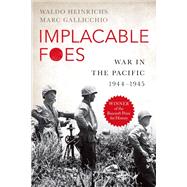
Implacable Foes War in the Pacific, 1944-1945
by Heinrichs, Waldo; Gallicchio, MarcBuy New
Buy Used
Rent Book
Rent Digital
How Marketplace Works:
- This item is offered by an independent seller and not shipped from our warehouse
- Item details like edition and cover design may differ from our description; see seller's comments before ordering.
- Sellers much confirm and ship within two business days; otherwise, the order will be cancelled and refunded.
- Marketplace purchases cannot be returned to eCampus.com. Contact the seller directly for inquiries; if no response within two days, contact customer service.
- Additional shipping costs apply to Marketplace purchases. Review shipping costs at checkout.
Summary
Following V-E Day, American citizens understandably clamored for their young men to be shipped back from Europe and longed for a return to a peacetime economy. Politics intruded upon military policy while a new and untested president struggled to control policy. The challenge of defeating the Japanese had come to seem nearly insurmountable. American casualty rates during the previous eighteen months led Army Chief of Staff General George C. Marshall to warn of the toll that "the agony of enduring battle" would likely take. General Douglas MacArthur clashed with Marshall and Admiral Chester Nimitz over strategy. Meanwhile, under pressure, the Army began a program of partial demobilization of troops in Europe, which depleted units at a time when combat-tested soldiers were most needed. In this context of military emergency, the fearsome projections of the human cost of invading the Japanese homeland, and weakening social and political will in the American homeland, seemed to make victory, unconditional or otherwise, an increasingly distant prospect.
In Implacable Foes, award-winning historians Waldo Heinrichs and Marc Gallicchio bring to life the final year and a half of World War II in the Pacific, combining grand strategy and ground-level account, taking readers from the island-hopping campaigns in the spring of 1944--New Guinea to the Philippines to Okinawa and Iwo Jima--right up to the dropping of the atomic bombs over Hiroshima and Nagasaki in August 1945. Heinrichs and Gallicchio reveal more fully than ever before not only the Japanese policies of desperate defense, but also the sometimes rancorous debates on the home front, and in the process deliver a gripping battle narrative integrated with a provocative and revisionist discussion of American decision-making. The result is a masterful work of military history, one that illuminates both the calculus of global war and the incalculable part played by individual sacrifice.
Author Biography
Waldo Heinrichs is Dwight E. Stanford Professor Emeritus at San Diego State University. He is the author of American Ambassador: Joseph C. Grew and the Development of the United States Diplomatic Tradition, which won the Allan Nevins Prize. Heinrichs served as an infantryman in the U.S. Army's 86th Division, one of the last two divisions to be deployed to Europe in World War II and the first to be redeployed to the Pacific in preparation for the invasion of Japan. He and his wife live in South Hadley, Massachusetts.
Marc Gallicchio is a Professor of History at Villanova University and was a Fulbright Visiting Lecturer in Japan, 1998 - 1999 and 2004 - 2005. He is the author of The African American Encounter with Japan and China: Black Internationalism in Asia, 1895 - 1945, which won the Society of Historians of American Foreign Relations Robert H. Ferrell book prize.
An electronic version of this book is available through VitalSource.
This book is viewable on PC, Mac, iPhone, iPad, iPod Touch, and most smartphones.
By purchasing, you will be able to view this book online, as well as download it, for the chosen number of days.
Digital License
You are licensing a digital product for a set duration. Durations are set forth in the product description, with "Lifetime" typically meaning five (5) years of online access and permanent download to a supported device. All licenses are non-transferable.
More details can be found here.
A downloadable version of this book is available through the eCampus Reader or compatible Adobe readers.
Applications are available on iOS, Android, PC, Mac, and Windows Mobile platforms.
Please view the compatibility matrix prior to purchase.
